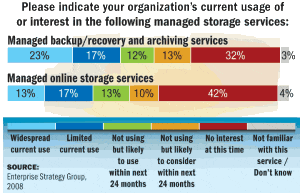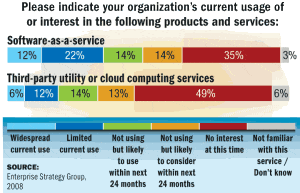It has become painfully evident to many small and medium-sized businesses (SMBs) that they don’t have the budgets or the personnel to effectively manage their own backups. It is a fact that storage vendors, value-added resellers, and service providers are well aware of, and it is the reason that online backup-and-recovery services are starting to gain ground as a no-muss, no-fuss alternative to traditional tape and disk backup systems in many organizations.
“Small businesses represent the low-hanging fruit for service providers. They are already budget constrained in terms of capital expenditures, and in this economy it’s going to get even harder for them,” says Lauren Whitehouse, an analyst with the Enterprise Strategy Group (ESG) research and consulting firm.
Whitehouse explains that online data-protection services help companies avoid hardware and software purchases, and often the fee for such services comes out of the operational budget. “It’s a more palatable option,” she says.
According to a pair of recent surveys conducted by ESG, medium-sized businesses—as well as the channel—are gravitating toward using Software-as-a-Service (SaaS) offerings.

All told, the research indicates that 40% of the medium-sized organizations surveyed make some level of production use of remote backup, recovery, and/or archiving services, and 30% have production level contracts of managed online storage services.
Insurance policy
Ideal Innovations is a consulting firm based in Virginia that specializes in biometrics, forensics, engineering, and security technologies for the government sector and private industry. The firm has three locations and about 350 employees—all supported by a small internal IT staff.
“In the event of a disaster, a full recovery could take up to four weeks,” says Joshua Mordin, Ideal Innovations’ director of IT. “It was problematic. We needed much tighter recovery points, and we needed to move our data off-site in case of a disaster.”
Buying backup hardware and software was not an option due to staffing limitations. When Mordin began evaluating backup options in 2007, his IT team numbered three, including he. Mordin looked at hardware, software, de-duplicating systems, and replication products. It was all too expensive and time-consuming.
“If we did it in-house we would have to buy the hardware and software and have a full- time employee dedicated to managing backups on a regular basis,” says Mordin. “Then we’d still have another problem: What if the building falls down?”
Ideal then looked locally for a remote solution. DS3 DataVaulting, an online backup services provider also based in Virginia, won the account by providing a backup-and-recovery service that detects and records only block-level changes, thereby reducing the amount of data that is required to be transmitted daily for backup. The data is compressed and encrypted on-site and transmitted via the Internet to the DS3 data vault where it is stored. User files are available at any time in the event that a restore operation is initiated.
DS3 backs up Ideal Innovations’ user directories, departmental folders, and a few other types of data on a nightly basis. It’s not much—about 1MB per night in differentials with a total of 250GB housed off-site.
“The primary benefit of the service is that it is an insurance policy,” Mordin explains. “I know that my data is being encrypted and backed up every night to an off-site location. Most importantly, I know it’s recoverable.”
Mordin has few complaints. He would prefer a more detailed billing invoice and account access to monitor pricing, but the overall savings versus an on-site backup system—and knowing that he can call on DS3 to fix any backup problems that arise—have him praising online services.
“Let the experts be the experts and we’ll rely on that expertise,” Mordin says. “It’s a no-brainer for small or medium IT shops.”
DS3’s online services are based on Asigra’s Televaulting multi-site backup-and-recovery software. The agent-free software uses utility service provisioning with a disk-based WAN-optimized architecture to scale performance and capacity.
Asigra powers the technology, DS3 provides the service, and customers don’t have to manage their own backups. However, while the number of regional service providers seems to grow daily, sometimes branding is everything.
According to ESG’s Whitehouse, the market is ripe with a mixed bag of managed service providers (MSPs), value-added resellers (VARs), and storage vendors all offering online backup-and-recovery services.
“There has been a mix for some time. SMBs typically rely on VARs to provide them with advice and many times those VARs are adopting technologies to become MSPs,” says Whitehouse. “If you’re a business that has been storing tapes with Iron Mountain, you’re likely to trust them when it comes to online backup.”
Peace of mind
Case in point: Jason Pappas, IT manager for Copeland Toyota in Brockton, MA, says Iron Mountain’s reputation sold him on its LiveVault backup-and-recovery service.
“We looked at some regional players and they were all fairly inexpensive, which concerned me. I don’t like to pay more, but I had concerns about where their data centers were located,” says Pappas. “It felt like the whole service might be a guy in his basement backing up my data.”
Pappas began reviewing his backup processes when his company—one of New England’s largest Toyota dealerships—moved into a new, state-of-the-art facility. New appliances or tape systems would have meant more gear to manage and more IT dollars spent and would not solve Pappas’ fundamental problems.
“I never took my tapes off-site. We stored them in a fireproof safe at the dealership,” says Pappas. “It was clear that we needed an online backup service or we needed someone to come and take our tapes off-site for us.”
Copeland Toyota is currently using Iron Mountain’s LiveVault data backup-and-recovery service to protect about 40GB of data from its file/print server and SurfControl Web Filter.
“It’s peace of mind. Copies of our data are made every 15 minutes vs. once every 24 hours using tape. If a file is corrupted, I don’t have to rush to the office to restore it. All I need is a laptop. I log in and restore it in just a few clicks,” says Pappas. “I don’t do backups anymore.”
Pricing for online backup-and-recovery services varies widely and is typically based on total protected capacity and optional features such as data retention periods and continuous data protection (CDP), but entry pricing for many backup-and-recovery services starts at well below $100 per month for 10GB or less.
Satisfaction guaranteed
Tyrone Santos, an accounting manager with the Interior Federal Credit Union (IFCU) in Washington, DC, pays about $72 per month to back up 4GB of sensitive financial data using Seagate’s i365 EVault online backup-and-recovery service.
“I would normally have to wait after hours to transport tapes off-site. It was a risky proposition because if I were to lose tapes we might as well shut down the whole Credit Union,” says Santos.
He was skeptical that the EVault service could inexpensively protect his data in a way that was easy to manage, but the prospect of buying a backup server and replicating data to a fail-over site was cost prohibitive. So he entered into a contract that was contingent upon his satisfaction in terms of performance and recoverability.
“We let it back up data for a week or two and then did a test restore. When we compared the restored data to our tape backups it matched exactly,” says Santos. “I can’t believe we went so long without it.”
For others who may be skeptical of outsourced backup operations—and in IT, that’s many people—there has been yet another development in SaaS-based storage services in recent months. Several vendors, most notably Symantec with its Backup Exec 12 software and Symantec Protection Network (SPN), have begun to offer hybrid systems with on-premise backups and off-site electronic vaulting for disaster recovery. It’s an area that ESG’s Whitehouse believes will attract users that might be wary of sending data out into the ether.
“Hybrid solutions with on-site backup capabilities and off-site electronic vaulting give users a way to dip their toes in the water,” says Whitehouse.
“They don’t have to relinquish control, but they can get their feet wet and reduce their carbon footprint by eliminating tape infrastructures,” she adds.

